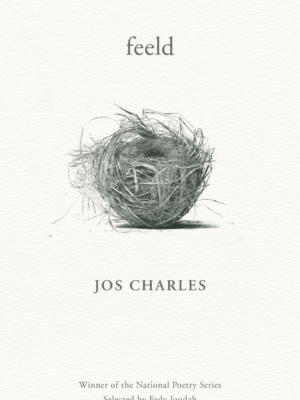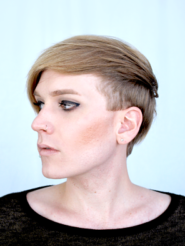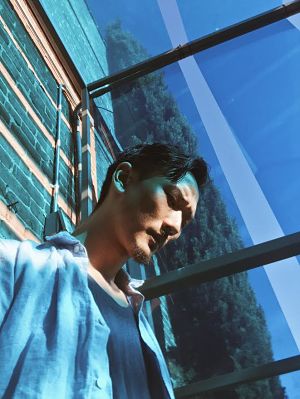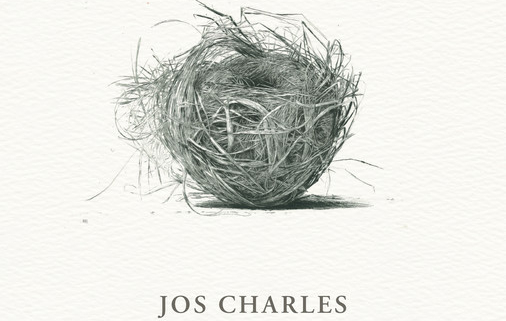Writers Read: feeld by Jos Charles
 The poet Vijay Seshadri said that “the purpose of poetry is to deal with unprecedented experience.” Poets will use unprecedented language, but few have made poems mostly made up of entirely unprecedented words. Jos Charles’s feeld accomplishes just that, living in an invented and unnamed dialect that is as new as it is familiar. Her text at first appears aberrant, yet bears the resonance of an original—as in, older and perhaps more faithful—English. At the same time, it has a clear sense of invention and modernity, reading like an ancient folio, an SMS with spelling from the future, an alternately evolved present-day speech. Charles’s amalgamation of medieval, modern, and historically speculative language renders her scenes of trans life in an uncommonly unique music.
The poet Vijay Seshadri said that “the purpose of poetry is to deal with unprecedented experience.” Poets will use unprecedented language, but few have made poems mostly made up of entirely unprecedented words. Jos Charles’s feeld accomplishes just that, living in an invented and unnamed dialect that is as new as it is familiar. Her text at first appears aberrant, yet bears the resonance of an original—as in, older and perhaps more faithful—English. At the same time, it has a clear sense of invention and modernity, reading like an ancient folio, an SMS with spelling from the future, an alternately evolved present-day speech. Charles’s amalgamation of medieval, modern, and historically speculative language renders her scenes of trans life in an uncommonly unique music.
The word glome appears throughout the book as a mysterious action, imbued with fluidity and life, possible of any number of definitions. Various places emerge and reappear throughout the book: the guarden, markett, feemale depositrie room, whorld, the linden... Among these too is the title’s feeld, which can be seen as a guide: though the poems are numbered in order, they form a landscape that recontextualizes every other part of itself and, much like the body, often goes on feel while the past (tense) and history is always there.
Each poem stands on its own, and the fragments comprising them deepen and morph when heard by themselves.
XXI:
bieng graselesse / mye breasthes
foldeing for the firste /
the cruelest retoric
fore givennesse / & ther big browne beerds
lik pubik slugg / i muste
re member / plese kepe ur handes
2 urself / i meen this
ontologicklie /
nayture is sumwere else
Perhaps more than any other poetry collection in recent memory, feeld lays bare the runic quality of language down to the word, the letter. The way “mye” carries both my and ye presents a multiplicity of meaning that both clarifies and obscures in its branching. “Breasthes” of course too immediately recalls breaths, or the sound of life, effortful and inevitable, both invisible and the means to surviving the body and thus being seen.
Charles writes in her author’s note: “Where there is no call is, now, where we must listen. Not to ask to see or be seen, but to be committed, again, and always again, to what we have always consented: unto the wood of the table, its form and time, to the room, the ash, its form, and its time.” And the runes return us to commitment:
foldeing for the firste /
and again:
re member / plese kepe ur handes
Far from merely a mental act, the appearance of “re member” suggests an alternate etymology that is more tactile and physical. Then the invocation of the active again-ness of keeping one’s hands. Then the oneness of “one” is challenged:
2 urself / i meen this
ontologicklie /
Charles’s script questions itself and the modes of bringing us to bodied considerations: her version of ontologicklie replaces ‘ally’ with ‘lie.’ Though, this is not deconstruction resulting in abandonment, the poem remains in the difficulty and wonder of commitment:
nayture is sumwere else
Perhaps this implies the nay is somewhere else, and the yes is present. But the yes here is more complex. Charles continues in her author’s note, “We stake a claim—this is my body, my breast, even as we doubt the words that lead us there, doubt the mineness, the body, and whose breasts are afforded purchase.”
Just as Charles needed to invent to produce language due to what she describes as a lack of existing satisfactory words to describe trans existence, the reader is invited to apply the closest reading possible. Any given word is potentially its own poem with origins in a parallel invented timeline. The poems when read out loud can sound as though coming from a person learning to speak for the first time… the reader in the moment must translate each moment, form the words slowly, sounding and sorting the inscriptions out in the mouth and the mind which conflict and harmonize in surprising ways. It sounds like a close reading, one that is always fruitful.
Throughout, the speaker seems to grasp their potency, as well as that of all language. From LV:
i kno
no new waye / 2 speech
this / the powre off lyons
Her address is likewise double, as an internal exploration and a more public discussion, addressing not only public spaces like bathrooms, but public behaviors like the “struktured responce” of shock (LVII), which is often a performance seeking absolution. Within the field of shapeshifting and ever-deepening exploration lies moments of undeniable clarity. Charles writes in LVII:
/ did u kno
not a monthe goes bye / a tran i kno doesnt dye / just
shye off 27 / its such a plesure to be alive /
Or sometimes it’s a clear question, which itself is a form of answer. From LIV:
/ o
u who unforl me / how manie
holes wuld blede / befor
u believ / imma grl
The problems of visibility come to the fore, resulting in statements that ascribe its startling weight and consequence, “a loss / being seen” (XLI.) or “it is horribel // off corse to be // tangibel” (IX.) or “it is tragyck / bieng undre // stood” (LII.)
For Charles, the element of sacrifice in creating and sharing this work is apparent. Yet, the voice in

Jos Charles
feeld remains committed, and gesturing toward a view of seeing as a daily-ness and a process. From XV:
it is pleesing
2 understande laybor as a feeld / a felt
past thru / i wuld see
u / grene inn that lande
And again, towards the end of the book, from LIX:
wee laybore
at mornynge / this is not
its seeson / i wil
herold the seeson
feeld is a difficult, rending, and immensely pleasurable book, magnetic in its immediate world of sounds and forking paths garden of linguistic innovations. A work to be savored and lost in, and entered as a beginning of the invitation to seeing and hearing what we may never fully have the language for.






